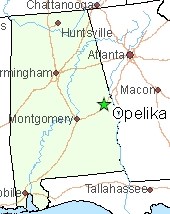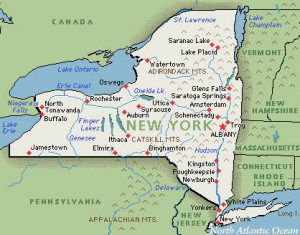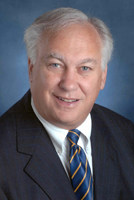 Opelika residents who cast votes in Tuesday’s special referendum on cable competition delivered a decisive “yes” to city officials seeking to build a fiber to the home cable and broadband system in the city.
Opelika residents who cast votes in Tuesday’s special referendum on cable competition delivered a decisive “yes” to city officials seeking to build a fiber to the home cable and broadband system in the city.
Although the turnout was just 18 percent, 62 percent of residents voting voted for the system’s construction, 38 percent said “no.”
For most of the supporters of the project, it was about delivering a resounding message to Charter Cable that their days of endless rate increases and sub-standard service in eastern Alabama were over.
Opelika mayor Gary Fuller was excited by the outcome of the vote.
“It’s a great day for Opelika. It’s a great day for our future. It’s a terrible day for Charter,” he told a crowd waiting to hear the mayor’s reaction to the results of the special referendum.
[flv width=”480″ height=”380″]http://www.phillipdampier.com/video/Opelika Votes Yes Cable Competition 8-10-10.flv[/flv]
The Opelika Auburn News captured some of the remarks from Opelika Mayor Gary Fuller announcing the results of the referendum. (4 minutes)
Fuller has been complaining about the lack of cable and broadband competition in Opelika for years, noting residents regularly complain about Charter Cable’s prices and service.
Part of the drive to look for alternatives may have come from watching a cable overbuilder, Knology, installing a $20 million fiber network down the road in nearby Auburn.
While Knology does compete with existing cable providers in many cities, it often takes years for the company to deliver service to every residence, if ever. In fact, Knology is most commonly found in multi-dwelling units like apartment buildings, condos, and new housing developments where construction costs are lower. Fuller proposes to build a network that will serve everyone. The city will negotiate with companies like Knology to use the new fiber network to provide service to residents.
“I believe that this is the most amazing thing that any of us as elected officials will ever do during our service in the city of Opelika, because of what it will mean to our future especially with high speed Internet that will be a calling card for high paying jobs in new industries for Opelika,” Fuller said.
Charter Cable fought hard to stop the network, but wasn’t always accurate along the way.
Skip James, Charter Communications government relations director, claimed other municipal networks were financial failures.
“It has been repeatedly demonstrated that when cities or municipal-owned power companies enter the video/data/phone business, it usually ends up costing the taxpayers at least twice as much as the consultant had suggested,” James said. “It also has resulted in many municipalities selling off the networks at significant losses or walking away from further operation of the network.
“After the initial system cost, the city has to stay abreast with the competition and changes in the marketplace by investing more money in costly upgrades. This is a high risk of taxpayer money, since the taxpayers are generally not aware that they have the ultimate responsibility for payment and/or default on the huge bonds to build and upgrade the system.”
Of course, many municipal systems are up, running, and profitable for the communities they serve. Construction delays and costly lawsuits from incumbent providers can delay such projects and boost costs, but since Opelika’s system will be built with revenue bonds, which are paid back through generated revenue, taxpayers cannot be left responsible for payments or defaults.
James could not understand why the city would want such a network when Charter was already serving the community.
 “Our communications system is in front of almost every house and business in the city of Opelika,” James said. “Why would the city want to risk so much taxpayer dollars and go into this much debt when a network already exists that can provide services the customers want at a much lesser cost?”
“Our communications system is in front of almost every house and business in the city of Opelika,” James said. “Why would the city want to risk so much taxpayer dollars and go into this much debt when a network already exists that can provide services the customers want at a much lesser cost?”
Opelika residents who wanted an alternative to Charter may have just voted their answer.
City officials will seek bids for construction work in the near future. Operations will be run by Alabama Light and Power.
There were a total of 2,819 ballots cast. Here’s how they broke down according to ward:
- Ward 1: 211 yes, 54 no
- Ward 2: 236 yes, 86 no
- Ward 3: 368 yes, 333 no
- Ward 4: 443 yes, 228 no
- Ward 5: 492 yes, 368 no
- Absentee ballots: 14 yes, 7 no
[flv]http://www.phillipdampier.com/video/WTVM Columbus GA Opelika Cable Controversy and Vote 8-10-10.flv[/flv]
WTVM in Columbus, Georgia covered the story of Opelika’s journey to build their own fiber network. (5 minutes)


 Subscribe
Subscribe






